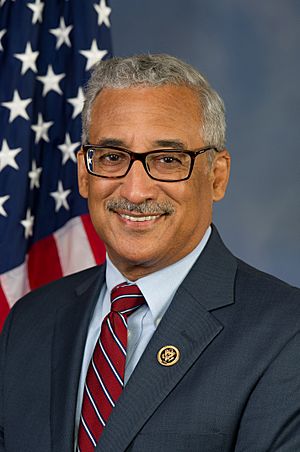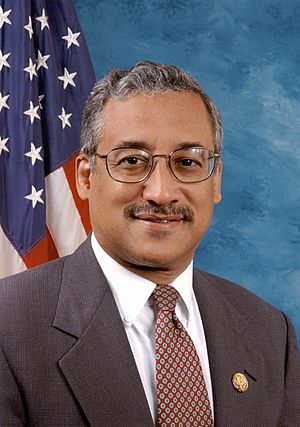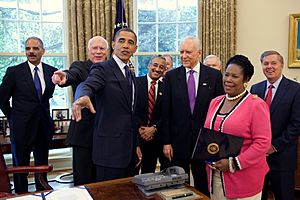Bobby Scott (politician) facts for kids
Quick facts for kids
Bobby Scott
|
|
|---|---|
 |
|
| Ranking Member of the House Education Committee | |
| Assumed office January 3, 2023 |
|
| Preceded by | Virginia Foxx |
| In office January 3, 2015 – January 3, 2019 |
|
| Preceded by | George Miller |
| Succeeded by | Virginia Foxx |
| Chair of the House Education Committee | |
| In office January 3, 2019 – January 3, 2023 |
|
| Preceded by | Virginia Foxx |
| Succeeded by | Virginia Foxx |
| Member of the U.S. House of Representatives from Virginia's 3rd district |
|
| Assumed office January 3, 1993 |
|
| Preceded by | Thomas Bliley |
| Member of the Virginia Senate from the 2nd district |
|
| In office January 12, 1983 – January 3, 1993 |
|
| Preceded by | Herbert Bateman |
| Succeeded by | Henry Maxwell |
| Member of the Virginia House of Delegates | |
| In office January 11, 1978 – January 12, 1983 Serving with Ted Morrison, Alan Diamonstein
|
|
| Preceded by | Lewis McMurran |
| Succeeded by | Mary A. R. Marshall |
| Constituency | 49th district (1978–1982) 48th district (1982–1983) |
| Personal details | |
| Born |
Robert Cortez Scott
April 30, 1947 Washington, D.C., U.S. |
| Political party | Democratic |
| Relatives | Marcia Price (niece) McKinley L. Price (brother-in-law) |
| Education | Harvard University (BA) Boston College (JD) |
| Website | |
| Military service | |
| Allegiance | United States |
| Branch/service | |
| Years of service |
|
| Unit | Massachusetts Army National Guard |
Robert Cortez Scott (born April 30, 1947), known as Bobby Scott, is an American politician and lawyer. He has been a U.S. Representative for Virginia's 3rd district since 1993. He is a member of the Democratic Party.
Bobby Scott is the longest-serving member of Virginia's group of representatives in Congress. He is also the first American of Filipino background to be a voting member of Congress. His district covers many areas in Hampton Roads where most people are Black. These areas include the cities of Norfolk, Newport News (where he lives), Hampton, Portsmouth, and parts of Chesapeake. From 2019 to 2023, Scott led the House Education and Labor Committee. Since 2023, he has been the top-ranking member of that committee.
Contents
Growing Up and School
Bobby Scott was born in Washington, D.C., and grew up in Newport News, Virginia. He has both African American and Filipino heritage. His father, Charles Waldo Scott, was a very important African American surgeon. In 1952, his father became the first African American to be chosen for the Newport News school board in the 1900s.
Scott's mother, Mae Hamlin-Scott, studied chemistry at the University of Michigan. She was a teacher who taught science in the Newport News public schools. His niece, Marcia Price, is a state delegate in Virginia.
Scott finished Groton School in 1965. He earned his first degree, a Bachelor of Arts, in government from Harvard College in 1969. He then earned his law degree, a Juris Doctor, from Boston College Law School in 1973. After law school, he worked as a lawyer in Newport News from 1973 to 1991.
Military Service
Bobby Scott served in the military. He was a member of the Massachusetts Army National Guard from 1970 to 1973. He also served in the Army Reserve from 1974 to 1976.
Serving in Virginia's Government
Scott was elected to the Virginia House of Delegates as a Democrat in 1977. He was then elected to the Senate of Virginia in 1982.
While serving in the Virginia legislature, Scott worked on several important issues. He helped make it easier for people with low incomes and children to get health care. He also supported increasing the minimum wage and providing more job training programs. He also wrote laws that gave tax breaks to businesses. These tax breaks were for businesses that helped local communities prevent crime or improve social services.
Representing Virginia in Congress
Becoming a U.S. Representative
Bobby Scott first tried to get elected to Congress in 1986. He ran in Virginia's 1st district but did not win that election.
In 1992, after the 1990 census, the U.S. government asked Virginia to create a new district. This new district would have a majority of Black residents. The Virginia legislature created the 3rd district, which included many Black residents from Hampton Roads and Richmond. Scott won the Democratic primary election for this new district with a large number of votes. He then won the general election easily, becoming a U.S. Representative.
Since 1992, Bobby Scott has been re-elected to Congress many times. He has won his elections by large margins, showing strong support from the people in his district. In 2016, his district boundaries changed a bit due to a court order. However, the district remained strongly Democratic. He has continued to win his elections, including in 2018, 2020, 2022, and 2024.
Key Work in Congress
Bobby Scott is the first African American to represent Virginia in Congress since the Reconstruction period after the Civil War. He is also the first American of Filipino background to be a voting member of Congress. His district in Virginia is the only one where most of the population is Black. It has been a very strong Democratic district since it was created in 1992.
Scott's annual Labor Day picnic is a popular event. Many candidates running for state and federal offices in Virginia attend this picnic.
Scott has supported many progressive ideas in the House of Representatives. He has voted to increase the minimum wage. He has also worked to stop unfair treatment against people in the workplace based on their sexual orientation. In 2010, he helped create a bill called the "Lee-Scott bill." This bill aimed to help people who had been unemployed for a long time find work.
Scott supports LGBTQ+ rights. In 2009, he voted for a law that made crimes against people based on their sexual orientation or gender identity a federal hate crime. In 2010, he voted to end the "Don't Ask, Don't Tell" policy, which had prevented openly gay people from serving in the military. In 2019, Scott voted for the Equality Act. This bill would make it illegal to discriminate against people based on their sexual orientation and gender identity.
Scott was a strong voice against the policies of President George W. Bush. He did not support the Patriot Act, saying that officials might misuse their power and unfairly target people based on their race. In 2002, Scott voted against the war in Iraq.
As the leader of the House Education and Labor Committee, Scott received high marks for his work. He was recognized for how well he oversaw government activities.
In 2023, Scott was one of the Democrats who voted against a bill called the Fiscal Responsibility Act of 2023. This bill was about the government's budget.
According to an analysis by FiveThirtyEight, Scott voted with President Joe Biden's positions 100% of the time during the 117th Congress.
Committee Roles
- Committee on Education and Labor (ranking member)
Groups He Belongs To
Bobby Scott is part of several groups in Congress, called caucuses. These groups bring together members of Congress who share similar interests or backgrounds. Some of the caucuses he belongs to include:
- Black Maternal Health Caucus
- Congressional Asian Pacific American Caucus
- Congressional Black Caucus
- Congressional Arts Caucus
- Congressional Cement Caucus
- Climate Solutions Caucus
- Medicare for All Caucus
Images for kids




